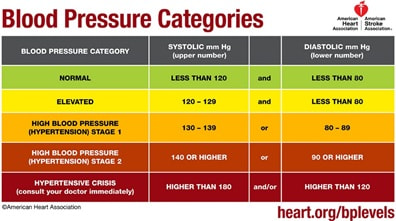Understanding Blood Pressure Numbers & What you Need to Know
How is blood pressure measured?
Blood pressure is the measure of the amount of force it takes for your heart to pump blood around your body. It is a good indication of how hard your heart is working. Your blood pressure is measured in millimeters of mercury (mmHg). Blood pressure less than 120/80 mmHg is in the normal range.1,2
What do the two numbers mean?
- The first (top) number is your systolic blood pressure. This is a measure of how much pressure is on your arteries (blood vessels) when your heart beats.
- The second number is your diastolic blood pressure. This number shows how much pressure is on your arteries when your heart is resting between beats.
Your pulse is the number of times your heart beats per minute. Most people’s heart beats 60 to 100 times per minute. That’s about 100,000 times per day!
What problems can high blood pressure cause?
If managing high blood pressure is left untreated it can cause damage to your heart, kidneys, brain, eyes, and more. It is a serious warning sign.
Can I tell if my blood pressure is high?
In general, hypertension is not usually accompanied by obvious signs and most people cannot feel if they have high blood pressure. But that does not mean damage is not happening. Readings above 120 mmHg systolic and/or higher than 80 mmHg diastolic, suggest a problem. If your measurements are high, it is time to do something. With the help of a Dario blood pressure monitor, you can measure whether your blood pressure is normal or out of range and refer to your healthcare provider.
Below is a table of blood pressure values divided into categories.

| MEASURE BLOOD PRESSURE NOW – manually or paired |
Medical Disclaimer
The articles provided on this website are for informational purposes only. In addition, it is written for a generic audience and not a specific case; therefore, this information should not be used for diagnostic or medical treatment. This site does not attempt to replace the patient-physician relationship and fully recommends the reader to seek out the best care from his/her physician and/or diabetes educator.
- https://www.heart.org/en/health-topics/high-blood-pressure/understanding-blood-pressure-readings
- https://www.webmd.com/hypertension-high-blood-pressure/guide/diastolic-and-systolic-blood-pressure-know-your-numbers#1
DAR-0159 RevA